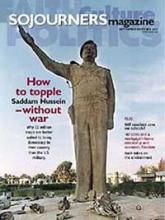Chris Rice, a former columnist for Sojourners, chronicles in Grace Matters: A True Story of Race, Friendship, and Faith in the Heart of the South his years living in Antioch, an interracial community in Mississippi that was modeled on the radical communalism of early Christians. Following is an excerpt from his book.
Black folks slowed down "Amazing Grace" into their own 15-minute version, making one word a line in itself: "Uh-uh-ahhhhhh-maaaay...zeeee-uh-inggggggg gra-uh-aaaaace." When they sang "that saved a wretch like me," they let "wretch" and "me" linger, like they felt it from a history of trials, from the agony of being crushed and having no greater power to depend on, no triumph to look to, except God's.
White folks in my WASP-y upbringing sang the same words with the confidence of those who tasted victory here and now, speeding them up to a happier, triumphant pace. Singing "a wretch like me" was more stating an idea, a theological concept. It wasn't like I really was a wretch. And in my lineage, if you ever experienced being wretched—in addiction, abuse, being cheated on or betrayed—you didn't let on. Personal pain was left outside church, stuffed in the closet at home, perfumed with public confidence, hidden by a thick veneer of niceness. When asked "How are you?" there was a correct answer: "Fine." In other words, "I am self-sufficient."
If the music opened up my heart and soul, "sharing time," Voice of Calvary's other notably grace-filled worship practice, had an equally dramatic effect on my proud perfectionist self, a self which was being more and more exposed on this turf.
For anywhere from 15 to 30 minutes in the middle of the service, the floor was opened to anyone to stand and offer thanksgivings or requests for prayer. What followed was not announcements, not just mentions of sickness, but raw public confession, usually from black members.
Read the Full Article
